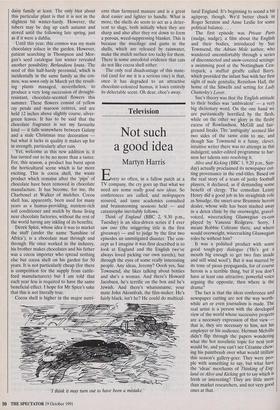Television
Not such a good idea
Martyn Harris
Eery so often, in a fallow patch at a TV company, the cry goes up that what we need are some really good new ideas. So conferences are called, and neivspapers scoured, and tame academics consulted and brainstorming sessions held — and catastrophe inevitably follows.
Think of England (BBC 2, 9.30 p.m., Tuesday) is an idea-driven series if I ever saw one (the sniggering title is the first giveaway) — and to judge by the first two episodes an unmitigated disaster. The con- cept as I imagine it was first described is to look at England and the English (we've always loved picking our own navels), but through the eyes of some really interesting people. Any ideas, Jeremy? Oooh yes, Sue Townsend, she likes talking about bottles and she's a woman. And there's Howard Jacobsen, he's terrific on the box and he's Jewish. And there's whatsisname, your mate John Akomfrah, the film-maker. He's fairly black, isn't he? He could do multicul-
tural England. It's beginning to sound a bit agitprop, though. We'd better chuck in Roger Scru ton and Anne Leslie for some political balance....
The first episode was Private Parts (nudge, nudge), a film about the English and their bodies, introduced by Sue Townsend, the Adrian Mole author, who wandered uncomfortably through a series of disconnected and snow-covered settings: a swimming pool at the Nottingham Cen- trepark; a stuffed giraffe called Barry, which provided the infant Sue with her first sight of male genitalia; Renishaw Hall, the home of the Sitwells and setting for Lady Chatterley's Lover.
Sue's theory was that the English attitude to their bodies was 'ambivalent' — a very big dictionary word. On the one hand we are puritanically horrified by the flesh, while on the other we glory in the fleshy excess of Rowlandson, McGill and fair- ground freaks. The 'ambiguity' seemed like two sides of the same coin to me, and though Sue Townsend is a funny, clever, intuitive writer there was no attempt in this indulgent, under-edited programme to har- ness her talents into resolving it.
Alive and Kicking (BBC 1, 9.20 p.m., Sun- day) actually proclaimed its newspaper cut- ting provenance in the end-titles. Based on the real story of a team of junky football players, it declared, as if demanding some benefit of clergy. The comedian Lenny Henry did a good job in his straightish role as Smudge, the smart-arse Brummie heroin dealer, whose wife has been stashed away in a detox clinic by the overweight, gravel- voiced, wisecracking Glaswegian ex-con played by Vanessa Redgrave. Sorry, I meant Robbie Coltrane there, and where would overweight, wisecracking Glaswegian roles be without him?
It was a polished product with some good tough-guy dialogue ('He's got a mouth big enough to get two fists inside and still wind wool). But it was marred by its tone of pious propaganda, for of course heroin is a terrible thing, but if you don't have at least one attractive, powerful voice arguing the opposite, then where is the drama?
The fact is that the ideas conference and newspaper cutting are not the way worth- while art or even journalism is made. The real artist is a person with the developed view of the world whose successive projects are a necessary expression of that view — that is, they are necessary to him, not his employer or his audience. Herman Melville didn't flip through the papers wondering what the hot novelistic topic for next year would be, and you can't see Cezanne chew- ing his paintbrush over what would titillate this season's gallery-goer. They were peo- ple with something to say, but what have the 'ideas' merchants of Thinking of Eng- land or Alive and Kicking got to say which is fresh or interesting? They are little more than market researchers, and not very good ones at that.


























































 Previous page
Previous page